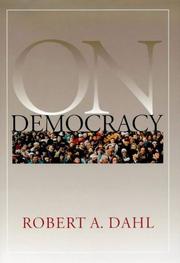Check nearby libraries
Buy this book

The last half of the twentieth century has been an era of democratic triumph. The main antidemocratic regimes - communist, fascist, Nazi - have disappeared, and new democracies are emerging vigorously or tentatively throughout the world. In this book, one of the most prominent political theorists of our time provides a primer on democracy that clarifies what it is, why it is valuable, how it works, and what challenges it confronts in the future.
Check nearby libraries
Buy this book

Previews available in: English
| Edition | Availability |
|---|---|
|
1
ʻAn al-dīmuqrāṭīyah
2000, al-Jamʻīyah al-Miṣrīyah li-Nashr al-Maʻrifah wa-al-Thaqāfah al-ʻĀlamīyah
in Arabic
- al-Ṭabʻah al-ʻArabīyah 1
|
zzzz
|
| 2 |
aaaa
|
Book Details
Edition Notes
Includes bibliographical references (p. 201-212) and index.
Classifications
The Physical Object
ID Numbers
Source records
Internet Archive item recordmarc_openlibraries_sanfranciscopubliclibrary MARC record
Better World Books record
Library of Congress MARC record
Internet Archive item record
marc_columbia MARC record
marc_columbia MARC record
Work Description
What is really meant by the term ""democracy""? How did democracy come about? What characteristics must a polity possess in order to be properly dubbed democratic? What is the relationship between capitalism and democracy? What are some challenges facing democracies in the 21st century? In this thorough but concise handbook by one of America's foremost political scientists, Yale professor Dahl (Democracy and Its Critics) answers these and other questions. The book is a highly structured work organized around subtopics on the origins of democracy, the democratic idea, actual democracies and conditions that favor or impede the development of democracy. Dahl discusses the tension between citizen participation and system effectiveness, the relative strengths and weaknesses of presidential versus parliamentary systems. Some of the best sections address the tension that exists in societies (e.g., the U.S.) where a democratic system based on political equality coexists with market capitalism, which yields economic inequality. Especially helpful are short ""words about words"" segments in which Dahl defines and clarifies terminology that is often used imprecisely (e.g., republic, representative, plurality system, etc.). Dahl's primary concern is the intersection between theory and practice, but his work is peppered with historical references to such advocates and critics of democracy as Plato, John Stuart Mill and James Madison. Dahl nimbly sketches the various issues and neatly frames controversies for the reader. His accessible style makes this an excellent introduction for novices, as well as a trusty handbook for experts and political science mavens.
Community Reviews (0)
Feedback?| July 15, 2024 | Edited by MARC Bot | import existing book |
| January 7, 2023 | Edited by MARC Bot | import existing book |
| August 23, 2020 | Edited by ImportBot | import existing book |
| February 13, 2020 | Edited by MARC Bot | remove fake subjects |
| December 9, 2009 | Created by WorkBot | add works page |













